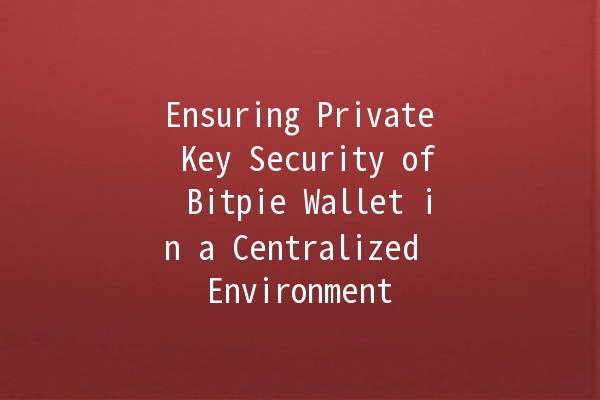
In today's digital age, where cryptocurrencies are becoming an essential part of our financial landscape, ensuring the security of your digital assets is more critical than ever. Among the various wallets available, Bitpie Wallet has gained popularity for its userfriendly interface and robust functionality. However, as users increasingly rely on centralized services, they often face the vulnerability of their private keys. This article will explore how Bitpie Wallet can ensure private key security in a centralized environment. We will delve into specific productivityenhancing techniques that users can apply to protect their assets effectively.
Understanding Private Key Security
What is a Private Key?
A private key is a cryptographic key that allows users to access and manage their cryptocurrency on the blockchain. In simpler terms, it's akin to a password. If someone gains unauthorized access to your private key, they can control your cryptocurrency holdings.
Why is it Important to Secure Your Private Key?
The significance of securing your private keys cannot be overstated. In a centralized environment, where sensitive information can be more susceptible to attacks, the importance of rigorous security measures increases. If a user's private key is compromised, the consequence may include irreversible loss of funds, making it vital to implement robust security practices.
Techniques to Secure Your Private Key in Bitpie Wallet
Here are five practical tips that users can apply to enhance the security of their private keys while using Bitpie Wallet:

Description: TwoFactor Authentication adds an extra layer of security beyond just a password. This method requires a user to provide two different types of information for verification.
Implementation:
Go to the Bitpie Wallet settings.
Select the "Security" option and enable 2FA.
Link it to your mobile authentication app (like Google Authenticator).
Example: By requiring not only a password but also a timesensitive code generated by an authenticator app, users create a significantly more secure environment for their assets.
Description: Leveraging strong and unique passwords is crucial for protecting your accounts from bruteforce attacks.
Implementation:
Generate a random password using a password manager.
Make sure it includes a mix of upper and lower case letters, numbers, and special characters.
Example: Instead of using "Password123," choose something like "s5K@pR2x7!qT" that is complex and hard to guess.
Description: Keeping your Bitpie Wallet app updated is essential for effective security as updates often include patches for known vulnerabilities.
Implementation:
Enable automatic updates in your device settings.
Regularly check the App Store or Google Play Store for updates.
Example: After an update, users might notice new security features as well as improved functionalities that help protect their private keys further.
Description: When setting up Bitpie Wallet, users receive a recovery phrase that acts as a backdoor to access their funds.
Implementation:
Write down the recovery phrase and store it in a safe place.
Avoid digital storage that could potentially be hacked, such as taking a screenshot.
Example: Store the written recovery phrase in a safe deposit box to ensure it remains confidential and secure from unauthorized access.
Description: Limiting your wallet's access to secure networks can decrease the chance of exposure to malicious attacks.
Implementation:
Always use a trusted WiFi network, such as your home connection.
Avoid public WiFi when accessing your wallet.
Example: By using a VPN while on a public network, you can disguise your IP address and encrypt your data transmission to add an extra layer of security.
The security of private keys is paramount in the realm of cryptocurrency, especially within centralized platforms. By taking proactive steps, such as enabling 2FA, utilizing strong passwords, regularly updating the app, backing up recovery phrases, and only interacting on trusted networks, users can significantly enhance their digital asset security. As the industry evolves, remaining informed about security practices will be the best strategy for safeguarding one's investments.
Frequently Asked Questions
Bitpie Wallet implements advanced encryption techniques to safeguard your private keys. Moreover, it allows the option to store your keys locally so they are not exposed to external servers, offering enhanced security.
If you lose your recovery phrase, you will not be able to access your Bitpie Wallet. It serves as the only method to restore your wallet if you need to reinstall or switch devices. Therefore, it is critical to store it securely.
Your private key remains on the blockchain. However, without your password or recovery phrase, you will not be able to access the Bitpie Wallet. Hence, maintaining these credentials is vital.
Yes, Bitpie Wallet is designed for both security and usability. However, it is advisable to store large amounts of cryptocurrency in cold wallets, while using Bitpie for daily transactions.
Yes, you can access your Bitpie Wallet from multiple devices, but ensure that you use the same credentials, and always keep your recovery phrase and passwords secure to prevent unauthorized access.
To keep your device secure, regularly update your operating system and installed apps, utilize antivirus software, and be cautious with the applications you install to prevent malware that might compromise your wallet.
Securing your private key is not just about technology; it also requires userawareness and practices that minimize risks. Implementing these strategies will go a long way in ensuring your digital assets remain safe while using Bitpie Wallet in an undoubtedly increasingly centralized environment.

